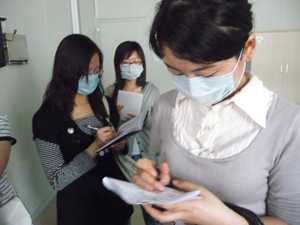Global Disease Detection Program: About Us
What We Do: Advance the Science of Global Public Health
With over a decade of experience between SARS and Ebola – and over 2,000 outbreaks and public health emergencies responded to – our work helps countries stop outbreaks at the source, before they become epidemics.
As CDC’s principal program for advancing the science behind global health security, the Global Disease Detection Program (GDD) works alongside partners to keep people safe and protect against the spread of disease to the U.S. and other countries. Our ten GDD Centers form a worldwide network to strengthen laboratories, respond to outbreaks, train the workforce, and create strong ties in countries to extend the possibilities of global health.
Why It’s Important

The world is full of diseases capable of finding us before we find them. Many emerging diseases could be devastating if left unchecked. The reach of the network of GDD Centers helps countries quickly identify and respond to diseases within their region.
To stop outbreaks faster, we need laboratory systems in place to determine which pathogens could be emerging as new diseases. We need surveillance networks in place to know what diseases are naturally occurring and at what levels, so we can recognize a problem that could signal a new threat. And we need to work together toward keeping the world safe from threats that could cross borders and affect us all.
Our centers offer a focused, systematic approach toward strengthening global health security, helping countries meet their commitments to international agreements like the International Health Regulations and the Global Health Security Agenda.
How We Do It
Our program uses proven scientific approaches to help countries grow their ability to prevent, detect, and respond to infectious disease threats. We address the core of what’s needed to build strong public health systems, including:
- Detecting and responding to emerging infectious diseases
- Developing a global workforce of disease detectives
- Strengthening laboratory systems and training workers to use them effectively
- Increasing preparedness and communication activities
- Addressing the animal-to-human interface responsible for zoonotic infections
- Conducting critical research to inform public health decisions
Research supported by GDD Centers can lead to policy change within countries. For example, scientists at the GDD Center in Kazakhstan worked closely with country partners to help them understand the science behind vaccination programs and the epidemiology of their population. Based on this information, the government of Kazakhstan issued a new policy to promote influenza vaccination for pregnant women and added an accompanying line item in the national budget to support this intervention and save lives.
Through centers located around the world, we receive information from other international surveillance and research networks. Programs across CDC use the GDD network to track diseases and syndromes, including acute febrile illness, antimicrobial resistance, and respiratory disease.
Our program is dedicated to training scientists to think independently, supporting research opportunities and contributing to the scientific knowledge base through surveillance and laboratory activities. We also access CDC’s expansive resources of scientific expertise through the Technical Support Corps (TSC), which offers 24/7 support to GDD Centers. Members of CDC’s Technical Support Corps represent these CDC centers and offices:
- National Center for Immunization and Respiratory Diseases
- National Center for Emerging and Zoonotic Infectious Diseases
- National Center for HIV/AIDS, Viral Hepatitis, STD, and TB Prevention
Where We Work
A central focus of our program is the establishment and expansion of GDD Centers, particularly in low-resource areas. Six of our ten GDD centers are located in partner countries for the Global Health Security Agenda. CDC operates GDD Centers in: 1) Bangladesh, 2) Central America (Guatemala), 3) Central Asia (Kazakhstan), 4) China, 5) Egypt, 6) India, 7) Kenya, 8) South Africa, 9) the South Caucasus (Georgia), and 10) Thailand. Learn more about where we work.
Fast Facts
From 2006-2016, GDD Centers have supported:
- Publication of over 875 peer-reviewed scientific articles
- Response to over 2,000 disease outbreaks and other public health emergencies, with nearly 2/3 of responses initiated within 24 hours of receiving a request for assistance
- Detection and identification of 11 novel strains and pathogens that were new to the world
- Detection and identification of 62 novel strains and pathogens that were new to a region
- Establishment of over 380 newly available in-country diagnostic tests in 59 countries, improving disease detection capability and contributing to faster response times.
Our Organization
Our laboratory and epidemiology teams work with some of CDC’s leading scientists and international partners to address today’s top public health challenges.
- Page last reviewed: October 16, 2017
- Page last updated: October 16, 2017
- Content source:


 ShareCompartir
ShareCompartir